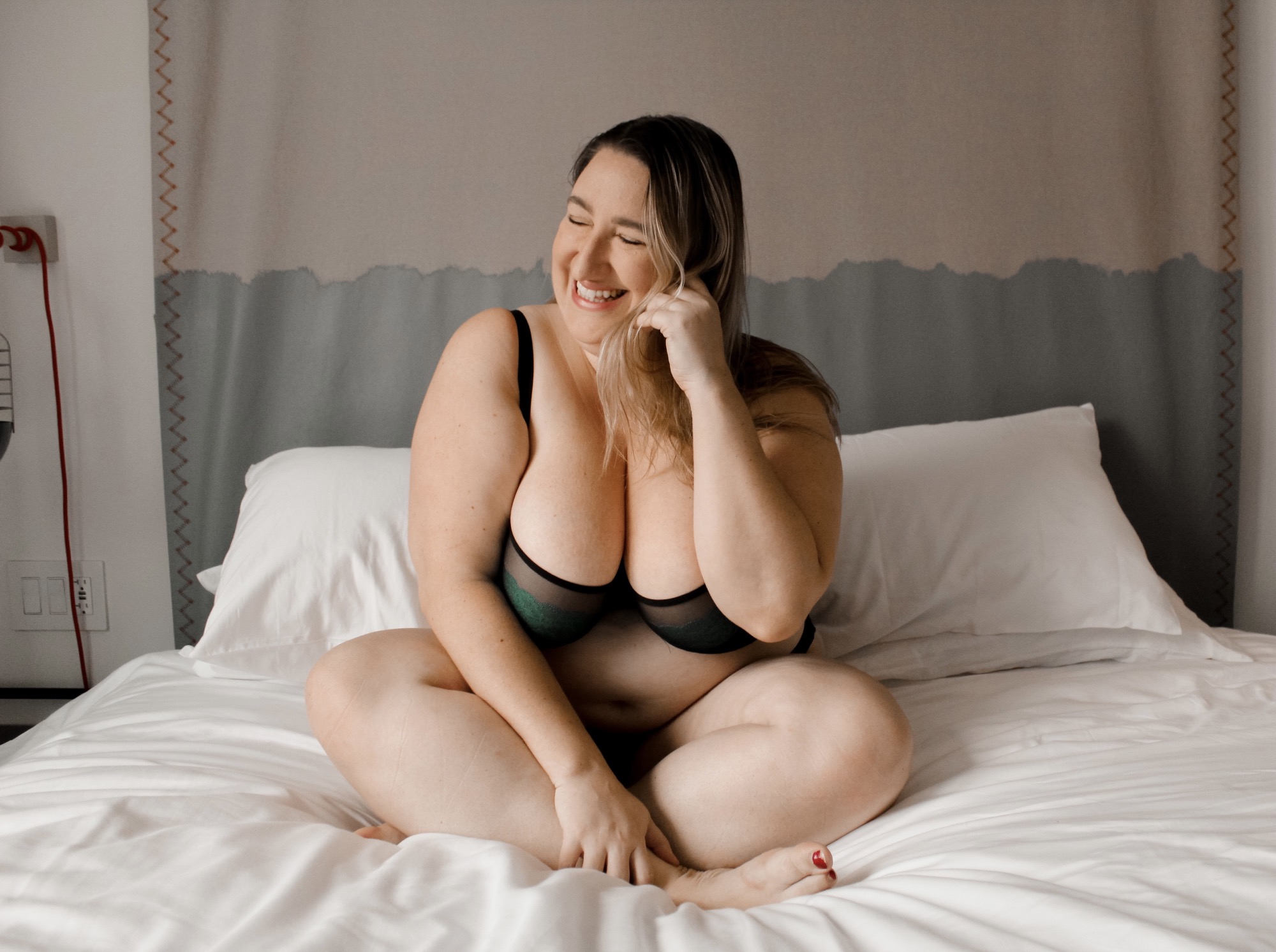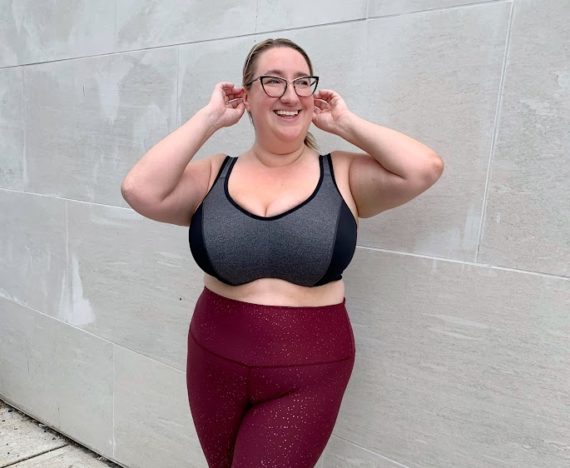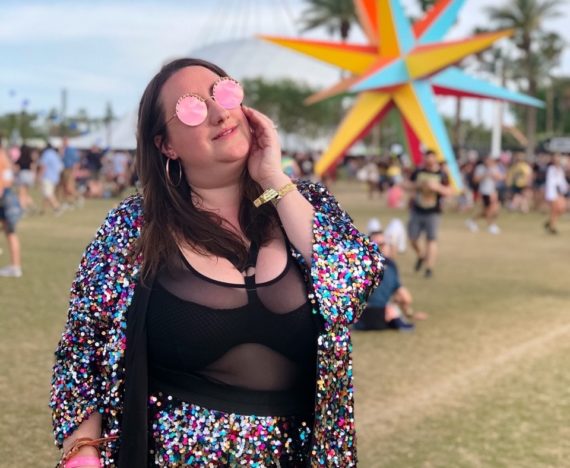Six Tools to Fight the “Quarantine 15” Diet Pressure

This last year has been hard in so many ways, but with vaccinations ramping up and the CDC issuing hopeful guidance, it feels like there is finally a light at the end of the proverbial tunnel. That of course makes me incredibly excited (as a community-fueled extrovert, I am beyond ready to get back out into the world!), but that is unfortunately tempered by the apprehension of the “lose that quarantine weight” deluge that is sure to come.
It is shaping up to be a lot like the annual “New Year, New You” weight loss garbage, but framed in a new way that many of us will feel more acutely because our bodies have actually changed after a year of staying at home. In a culture that puts so much value on “keeping the weight off,” putting any on can all too easily feel like a failure, even at the best of times.
And then there is the added layer of reopening coinciding with one of the diet industry’s most effective constructs: “Beach body” season. The approach of summer can be difficult for anyone who is ever a little less than perfectly confident about their body (aka pretty much everyone), but the tone and tenor of the shame in the ads has ramped up this year with the added “lose that quarantine weight” pressure, seeking to capitalize on our insecurities. And I DO mean capitalize. The diet and weight loss industry needs you to accept that your body isn’t good enough so they can line their pockets paying them to “fix” it.
But let me remind you something they don’t want you to know: There’s nothing to fix. You are beautiful and valid exactly the way you are. YES, YOU. Yes, even if your body has grown and changed over the last 12 months, and looks different than it ever has before (I know mine does). Bodies change. That’s okay.
So every single time you see a diet or weight loss ad, actively remind yourself that they are just looking to profit off of you. Remind yourself that it is one of the biggest grifts in history, and that’s according to science (long-term weight loss from diets is statistically nearly impossible). So don’t buy what they are selling you.
Instead, arm yourself with these mental and emotional tools to combat this all-too-pervasive narrative. And unlike the multi-billion diet industry’s products, each and every one of these tools is absolutely free!
(1) Fill your social feed with beautiful bodies of all shapes and sizes (particularly those you don’t see held up as the ideal) to counteract the media norms that say only one type of body is valid. Seeing the beauty in all sorts of bodies is a gateway to seeing it in yourself. As anyone that grew up on glossy magazines knows, the media we consume can affect how we feel about ourselves. Fortunately, big media conglomerates no longer have a top-down stranglehold on representation, and we can create our own beautifully diverse “magazines” by following and regularly interacting with plus size creators on social.
That second part is particularly crucial, because while social media is more decentralized than traditional fashion publications, there are still discriminatory algorithms in place that will prioritize content from traditionally valued bodies unless you actively tell them otherwise. By commenting on, saving, and sharing fat creator’s posts, you’ll be able to start seeing a feed that makes you feel better instead of worse (and you’ll get some great fashion inspiration while you’re at it!). It is the best type of win-win.
(2) Decline diet talk when it happens around you. The first time I heard a variation on this advice, I remember being a bit shocked – it had never even occurred to me that opting out was an option! Now it is a tool I employ with ease. If you are worried about how it will play out, having a short internal script at the ready helps. My go-to is “I don’t engage in weight loss talk, but how was your weekend [or any question that changes the subject]?” Often that conversation reset will end the weight loss discussion, but if it doesn’t, just politely excuse yourself, and walk away if possible.
(3) Question, question, question! Whenever you find yourself thinking that you “should” change your body or lose weight, make an effort to stop and question where that thought stemmed from. For most of us, there won’t be just one source – we’ve been steeped in a culture that values thinness highly our whole lives, after all – but I can often isolate one source that kicked a particular toxic thought up to the top of my mind if I try. At that point, I ask the question that I think we should all ask regularly: Who profits from this thought?
The answer is almost never *you.* It might be the plastic surgeons who offer liposuction, double-chin reductions, and countless other procedures to “fix” fatness; it might be the multibillion-dollar diet industry hoping to reel you back in to a lifetime of dieting, gaining it back, and dieting again; it might be the all-too-large segment of the modern “wellness” industry that is simply the weight loss industry in sheep’s clothing; but it almost certainly is not benefitting you. All the messaging that your body isn’t good enough doesn’t do a single thing for your health or well-being: We don’t take good care of things we hate. So keep questioning why you are tearing yourself down, and remember how these industries keep profiting if we let them.
(4) Find your community. Now this one is harder while we are still in the midst of a pandemic, but whether we are talking online now, or in person in the future, surrounding yourself with awesome, body-positive plus size women is a great way to be regularly and tangibly reminded that we are so much more than our sizes. The cultural narrative around fatness often flattens us to nothing more than our fat bodies, but we are nuanced, complex, and multi-faceted in the same way all women are. Our shared experiences are important and can bring us together, but any gathering of plus women will have conversations that go well beyond size.
The power of plus community has been so profound to me that I actually founded one of my own: New York City Plus. It is meant to be an IRL community, so our core monthly events will resume once it is safe to gather, but you can follow along on our NYC+ community account in the meantime to stay up to date.
View this post on Instagram
(5) Take *hot* photos of yourself. This one might seem silly or superficial, but there is actually such power in reclaiming your own sexiness, especially when society is trying to say that fat bodies cannot be sexy. These photos can be for your eyes only, but having them to look at on days when you are feeling down can be a much-needed visual reminder: I am a baddie.
(6) Give yourself grace. One thing I try to remember is that we are almost always harder on ourselves than we are on anyone else. Even after nearly a decade of being immersed in body positivity and fat acceptance, there are still days when I struggle with my own body image. That doesn’t mean I’m failing at self-confidence; it just means I’m human. We all have off days, and it is important that we don’t feel the need to beat ourselves up when they happen. Instead, when you are out of the thick of it, try to use some of the tools listed here to examine why you had that moment, and then give yourself the space to let it go and move forward. As corny as it is to say, it is true: Self-love is a journey, not a destination. It takes ongoing mental and emotional work, but I can personally attest that it is so, SO worth it!
Finally, free to reach out to me if you need support. I love this community so much and I am here for you ❤️



